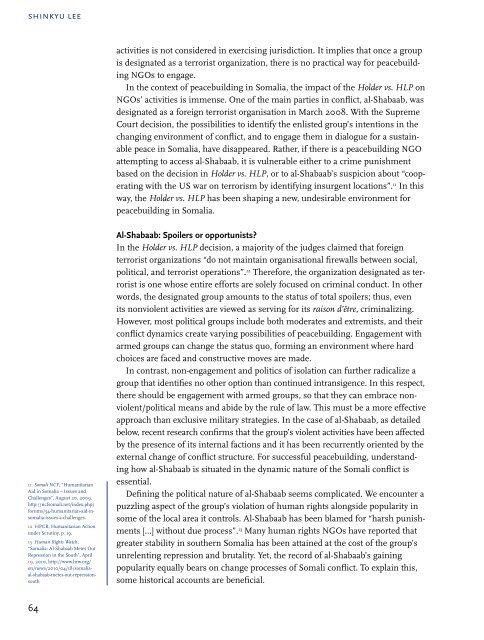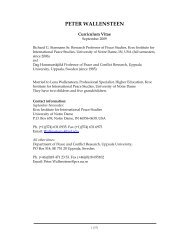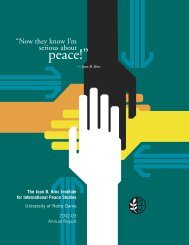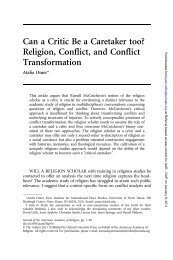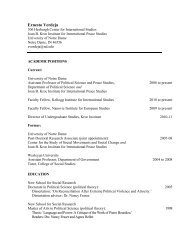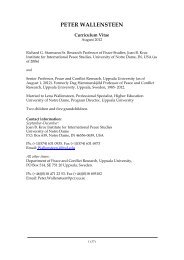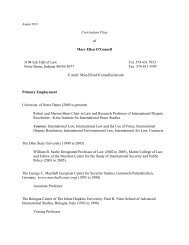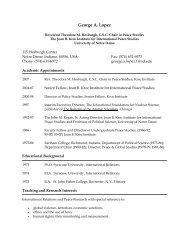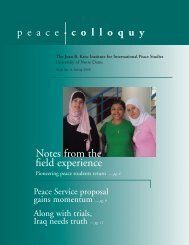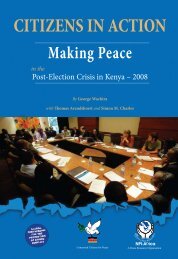Somalia: Creating Space for Fresh Approaches to Peacebuilding
Somalia: Creating Space for Fresh Approaches to Peacebuilding
Somalia: Creating Space for Fresh Approaches to Peacebuilding
You also want an ePaper? Increase the reach of your titles
YUMPU automatically turns print PDFs into web optimized ePapers that Google loves.
shinkyu lee<br />
11 Somali NCF, “Humanitarian<br />
Aid in <strong>Somalia</strong> – Issues and<br />
Challenges”, August 20, 2009,<br />
http://ncfsomali.net/index.php/<br />
<strong>for</strong>ums/54-humanitarian-aid-insomalia-issues-a-challenges.<br />
12 HPCR, Humanitarian Action<br />
under Scrutiny, p. 19.<br />
13 Human Rights Watch,<br />
“<strong>Somalia</strong>: Al-Shabaab Metes Out<br />
Repression in the South”, April<br />
19, 2010, http://www.hrw.org/<br />
en/news/2010/04/18/somaliaal-shabaab-metes-out-repressionsouth<br />
64<br />
activities is not considered in exercising jurisdiction. It implies that once a group<br />
is designated as a terrorist organization, there is no practical way <strong>for</strong> peacebuilding<br />
NGOs <strong>to</strong> engage.<br />
In the context of peacebuilding in <strong>Somalia</strong>, the impact of the Holder vs. HLP on<br />
NGOs’ activities is immense. One of the main parties in conflict, al-Shabaab, was<br />
designated as a <strong>for</strong>eign terrorist organisation in March 2008. With the Supreme<br />
Court decision, the possibilities <strong>to</strong> identify the enlisted group’s intentions in the<br />
changing environment of conflict, and <strong>to</strong> engage them in dialogue <strong>for</strong> a sustainable<br />
peace in <strong>Somalia</strong>, have disappeared. Rather, if there is a peacebuilding NGO<br />
attempting <strong>to</strong> access al-Shabaab, it is vulnerable either <strong>to</strong> a crime punishment<br />
based on the decision in Holder vs. HLP, or <strong>to</strong> al-Shabaab’s suspicion about “cooperating<br />
with the US war on terrorism by identifying insurgent locations”. 11 In this<br />
way, the Holder vs. HLP has been shaping a new, undesirable environment <strong>for</strong><br />
peacebuilding in <strong>Somalia</strong>.<br />
Al-Shabaab: Spoilers or opportunists?<br />
In the Holder vs. HLP decision, a majority of the judges claimed that <strong>for</strong>eign<br />
terrorist organizations “do not maintain organisational firewalls between social,<br />
political, and terrorist operations”. 12 There<strong>for</strong>e, the organization designated as terrorist<br />
is one whose entire ef<strong>for</strong>ts are solely focused on criminal conduct. In other<br />
words, the designated group amounts <strong>to</strong> the status of <strong>to</strong>tal spoilers; thus, even<br />
its nonviolent activities are viewed as serving <strong>for</strong> its raison d’être, criminalizing.<br />
However, most political groups include both moderates and extremists, and their<br />
conflict dynamics create varying possibilities of peacebuilding. Engagement with<br />
armed groups can change the status quo, <strong>for</strong>ming an environment where hard<br />
choices are faced and constructive moves are made.<br />
In contrast, non-engagement and politics of isolation can further radicalize a<br />
group that identifies no other option than continued intransigence. In this respect,<br />
there should be engagement with armed groups, so that they can embrace nonviolent/political<br />
means and abide by the rule of law. This must be a more effective<br />
approach than exclusive military strategies. In the case of al-Shabaab, as detailed<br />
below, recent research confirms that the group’s violent activities have been affected<br />
by the presence of its internal factions and it has been recurrently oriented by the<br />
external change of conflict structure. For successful peacebuilding, understanding<br />
how al-Shabaab is situated in the dynamic nature of the Somali conflict is<br />
essential.<br />
Defining the political nature of al-Shabaab seems complicated. We encounter a<br />
puzzling aspect of the group’s violation of human rights alongside popularity in<br />
some of the local area it controls. Al-Shabaab has been blamed <strong>for</strong> “harsh punishments<br />
[…] without due process”. 13 Many human rights NGOs have reported that<br />
greater stability in southern <strong>Somalia</strong> has been attained at the cost of the group’s<br />
unrelenting repression and brutality. Yet, the record of al-Shabaab’s gaining<br />
popularity equally bears on change processes of Somali conflict. To explain this,<br />
some his<strong>to</strong>rical accounts are beneficial.


